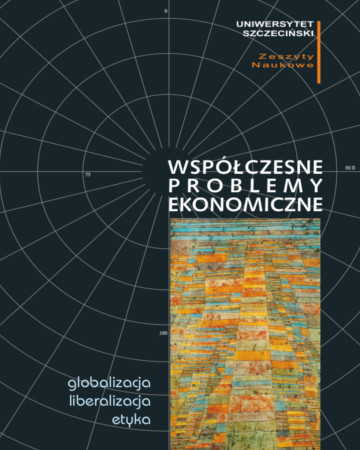
ISSN: 2081-9579
eISSN: 2353-2815
OAI
DOI: 10.18276/wpe.2016.12-12


Issue archive /
nr 12 (2016)
Die Gewinnmaximierung aus der Sicht der Ethik
(Profit Maximization from the Perspective of Ethics)
| Authors: |
Hermann
Witte
Logistik und Umwelt-ökonomie, Institut für Management und Technik, Hochschule Osnabrück, Campus Lingen |
| Keywords: | competition economic sustainability economic equilibrium ethic profit maximization |
| Data publikacji całości: | 2016 |
| Page range: | 18 (135-152) |
Abstract
Pure competition profit maximization is a good and necessary strategy to run an enterprise without loss, and to keep it in the market. Incomplete competition or workable competition profit maximization is not an acceptable strategy. Increasing and constant prices profit maximizations is never-ending. Only decreasing prices profit maximizations lead analogously in pure competition to the ‘break-even-point’. At this point, an enterprise covers the cost. An enterprise has no loss and no profit. Now, it is clear why enterprises in practice have such a great interest in advancing prices and decreasing wages. In the minimum enterprises, wages increase less than prices.27 These measures are optimal in combination with maximizing profits. The consequences of profit maximization are not only increasing prices and not proportional increasing (real decreasing) wages, but also closed down enterprises, people losing their jobs, capital concentration, increasing private and national debt, people becoming poor, etc. An economic situation beneath human dignity is growing up. The human dignity is irreproachable,28 as well as freedom and security are fixed as human rights29 in a great number of constitutions. But it is impossible to secure these rights for all people under the rule of profit maximization. The human rights, which are established for ethical reasons, are reproachable. The actual policy tries to solve this situation by requiring saving. But it is impossible. The only successful way is to secure economic equilibriums and economic sustainability. It is the aim which a great number of states imposed on themselves by signing the Agenda 2130 a long time ago.
Download file
Article file
Bibliography
| 1. | Bücher K., Das Gesetz der Massenproduktion, „Zeitschrift für die gesamte Staatswissenschaft“ 1910, no. 66. |
| 2. | Bundesministerium für Umwelt, Naturschutz und Reaktorsicherheit (Hrsg.), Umweltpolitik.Konferenz der Vereinten Nationen für Umwelt und Entwicklung im Juni 1992 in Rio de Janeiro – Dokumente, Agenda 21, Bonn o.J. |
| 3. | Busse F.J., Grundlagen der betrieblichen Finanzwirtschaft, 4. Aufl., München, Wien 1996. |
| 4. | Chamberlin E.H., The Theory of Monopolistic Competition, 8th Ed., 3rd Printing, Cambridge (Mass.) 1969 (1st Ed. 1933). |
| 5. | Clark J.M., Towards a Concept of Workable Competition, “American Economic Review” 1940, Vol. 30. |
| 6. | Cobb C.W., Douglas P.H., A Theory of Production, in: “American Economic Review” Vol. XVIII (1928), Supplement. |
| 7. | Euchner W., Grebing H. u.a.: Geschichte der sozialen Ideen in Deutschland: Sozialismus – Katholische Soziallehre – Protestantische Sozialethik, 2. Aufl., hrsg. V. Grebing, H., Wiesbaden 2005 (Essen 20001). |
| 8. | Europäische Kommission: Eine neue EU-Strategie (2011–2014) für die soziale Verantwortung der Unternehmen (CSR), KOM(2011) 681 endg. |
| 9. | Europäische Kommission: Europäische Rahmenbedingungen für die soziale Verantwortung der Unternehmen – Grünbuch, KOM(2001) 366 endg. |
| 10. | Gesetz gegen Wettbewerbsbeschränkungen (GWB) vom 27. Juli 1957 (BGBL. I S. 1081) in der Fassung der Bekanntmachung vom 26. August 1998 (BGBl. I S. 2546), geändert durch Gesetz vom 22. Dezember 1999 (BGBL. I S. 2626). |
| 11. | Grundgesetz für die Bundesrepublik Deutschland in der im Bundesgesetzblatt Teil III, Gliederungspunkt 100-1, veröffentlichten Fassung, das zuletzt durch Artikel 1 des Gesetzes vom 11.Juli 2012 (BGBL. I S.1478) geändert worden ist. |
| 12. | Hauff V. (Hrsg.), Unsere gemeinsame Zukunft. Der Brundtland-Bericht, Greven 1987. |
| 13. | Jaeger K., Gleichgewicht, ökonomisches, in: Handwörterbuch der Wirtschaftswissenschaft (HdWW), 3. Bd., Stuttgart u.a. 1981. |
| 14. | Knight F., Risk, Uncertainty and Profit, New York 1921. |
| 15. | Konvention zum Schutz der Menschenrechte und Grundfreiheiten, vom 4. November 1950 (BGBl. 1952 S. 686). |
| 16. | Marx K., Das Kapital. Kritik der politischen Oekonomie, 1. Bd., 40. Aufl., Berlin 2013, 2. Bd. 33. Aufl., Berlin 2012, 3. Bd., 34. Aufl., Berlin 2012 (Hamburg 18671). |
| 17. | Mises, L.v.: Die Gemeinwirtschft – Untersuchungen über den Sozialismus, Jena 1922. |
| 18. | Nell-Breuning, O.v.: Die soziale Enzyklika, Köln 1932. |
| 19. | Nell-Breuning, O.v.: Soziallehre der Kirche, Wien 1977. |
| 20. | Norén R., Equilibrium Models in an Applied Framework, Berlin, Heidelberg 2013. |
| 21. | Ostrom E., Governing the commons: The evolution of institutions for collective action, Cambridge u.a. 1990 (deutsch: Die Verfassung der Allmende: Jenseits von Staat und Markt, Tübingen 1999/Dritter Nachdruck 2013). |
| 22. | Samuelson P.A., Economics, New York 1948 (200919 mit Nordhaus, W.) (deutsch: Volkswirtschaftslehre, 3. Aufl., 2007). |
| 23. | Thiemeyer T., Gemeinwirtschaftlichkeit als Ordnungsprinzip: Grundlegung einer Theorie gemeinnütziger Unternehmen, Berlin 1970. |
| 24. | Walras L., Éléments d´économie politique pure ou théorie de la richesse sociale, Lausanne, Paris, Bale (Basel) 1874. |
| 25. | Witte H., Die nachhaltige Marktwirtschaft. Wirtschaften ohne self-made Krisen, Berlin 2013. |
| 26. | Witte H., The Monetary Production Function as Basis of Sustainability, in: Sustainable Logistics, eds. H. Witte, M. Jedlinski, R. O. Dichiara, Bahia Blanca 2012. |
| 27. | Wöhe G., Bilstein J., Grundzüge der Unternehmensfinanzierung, 5. Aufl., München 1988. |